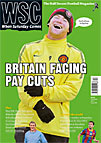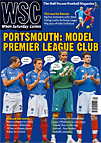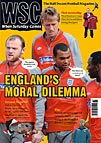 Dear WSC
Dear WSC
I would like to ask my fellow readers if their clubs have something called “The Nardiello Factor”. The Nardiello Factor is a phenomenon where a striker’s popularity is based in a large part on the exotic nature of his name. At Barnsley we have seen no finer example of this than in recent months with the arrival of Jerónimo Morales Neumann. My fellow Tykes have been beside themselves at the thought of this player, and have wondered how Mark Robins can possibly limit him to just warming the bench. This opinion seems based on nothing more than the fact that he has a name that would be good to shout out when (if) he scores. Our Jerónimo accordingly scores a Nardiello Factor rating of nine (the maximum score is ten). Contrast this with Chris Woods, our loanee from West Brom. He scores a paltry NarFac rating of four. Were he to slightly change his name to Christiano Woodaldo he would up his NarFac rating to eight but, alas, this is not to my knowledge due for consideration. As a consequence the support from the terraces has been a little limited to date. Liam Dickinson scores a NarFac rating of one, though I am willing to concede that, even if he changed his name to Galileo Figaro Magnifico, he’d do well to register a NarFac rating of five. His yellow boots have had a negative impact.
Ian Marsden, Belper
Search: ' Milton Keynes'
Stories
 Dear WSC
Dear WSC
Congratulations on the article about match-fixing (Crimes and misdemeanours, WSC 283). Paul Joyce did a superb job reviewing the many different cases of corruption in European football. As the German police investigation began, partly because of the controversy around my book, The Fix, I did want to take him up on one issue. He mentioned that “Germany lies second in the match-fixing table” – this is true but it is not because corruption is more prevalent in German football. Rather it is because the German authorities are now, after years of denial, actually taking the issue seriously and are vigorously investigating match-fixing – and the more they investigate, the more they find. This proactive attitude is in stark contrast with British football authorities who seem to have adopted the attitude of “don’t know, don’t want to find out”. The circumstances in British football are similar to other European countries: thousands of relatively badly paid players; lots of poor clubs and lots of interest in the gambling markets. However, the British authorities have not yet fully woken to the dangers. I can only hope that they do before they discover a similar problem to the one in Europe.
Declan Hill, Oxford
 Dear WSC
Dear WSC
I was very interested in the letter (WSC 276) discussing the topic of the Duckworth-Lewis of football that is stoppage time. Are there any WSC readers who are aware of stoppage allowance for cheating ball boys? I attended Colchester v Southampton in December 2009. The home side took a two-goal lead before the Saints slowly clawed their way back into the game. However, our momentum was thwarted by a series of ingenious defensive set-pieces that can only be attributed to hours of practice on the training ground. They went like this: ball goes off for a Saints throw or goal-kick, ball boys strategically placed around the ground retrieve the ball in exaggerated slow motion or, if the pressure was really on, then not at all. One very clever set-piece saw the ball rest at the feet of the ball boy. He then sat motionless on his stool causing Kelvin Davis to have to race 20 yards to retrieve the ball. Should the fourth official have added stoppage time to thwart this cunning plan? And have any other away teams been subjected to such coaching genius?
Tony Cole, Leigh on Sea
 Recent times have taken a drastic toll on football in Luton and south-west London, but things are looking up. After an 18-year gap Andy Brassell returns to Kenilworth Road with AFC Wimbledon
Recent times have taken a drastic toll on football in Luton and south-west London, but things are looking up. After an 18-year gap Andy Brassell returns to Kenilworth Road with AFC Wimbledon
How did we end up here? The last time many of the 1,000-odd Wimbledon fans who made the trip to Luton on February 20 visited was back in April 1992. The home side that day won 2-1 but failed to stave off relegation from Division One, while the visitors went onto become founder members of the Premier League a few months later.
 Dear WSC
Dear WSC
In response to my letter published in WSC 275, Mark Brennan Scott accepts that we send someone to each of the weekend’s Premier League games, to commentate live, but not unreasonably asks whether Match of the Day commentators ever “re-record bits they are unhappy with”. Not exactly, but the beauty of an edit rather than a live game is there is scope for tweaking both the sound and visuals by transmission time. Every now and then, a commentator will, for example, misidentify a goalscorer and then correct themselves, in which case we have been known to remove take one in the edit. I’ve found a copy of a letter I had published in WSC 240 in which I said: “If a commentator gets something wrong at the time we may even spare him his blushes at 10pm by removing the odd word.” That remains the case, but most of the time the commentator’s natural reaction works best. If it takes a couple of replays before they identify a deflection or suspicion of handball, that will nearly always feel more authentic than trying to look too clever after the event. In shortening a game for transmission, we may occasionally “pull up” a replay or remove a few words, but would almost never re-record any section of a commentary unless there’s been a technical problem. Furthermore, in all cases the commentators go home after the post-match interviews and a producer back at base edits the pictures and sound recorded at the time. In early days of the Premier League, only two or three games had multi-camera coverage and commentators present, so there were occasional attempts to add a commentary to single-camera round-up games, for example, for Goal of the Month. However, not every commentator was a convincing thespian and one or two “Le Tissier’s capable of beating three men from here and curling one into the top corner. Oh my word, he has…” moments did slip through. With multi-camera coverage and a commentator at every game, that no longer happens.
Incidentally, call us old-fashioned but there was a degree of pride in this office in MOTD’s recent use of “crashed against the timber” as cited in Steve Whitehead’s letter. Better that – or maybe “hapless custodian” – than some unpleasant modern notion like “bragging rights”.
Paul Armstrong, Programme Editor, BBC Match of the Day